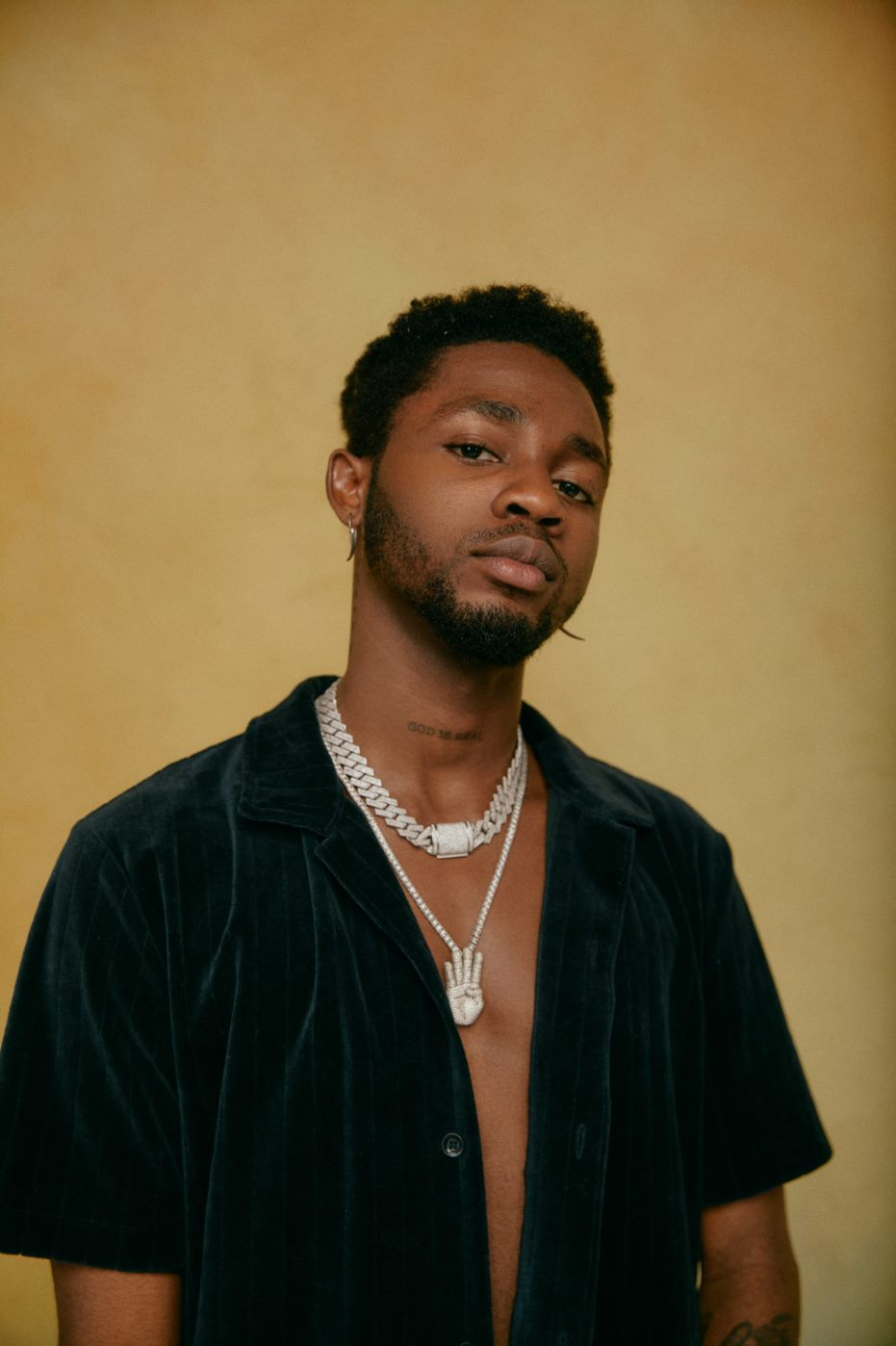
Many solid, record-breaking Afrobeats projects were released last year, as the genre continued to spread across international airwaves and music charts, but few managed to be as introspective as Omah Lay’s debut album, Boy Alone, the 14-track offering which saw the 26-year-old artist tackle mental health in a healing way.
“I was in a dark place when I made this album,” Omah Lay tells Complex, “but the process made me grow up and see things differently. I learned how to be a better person and that’s where I am now, enjoying my life and having fun.” It’s safe to say Omah has forged a unique lane for himself with a sublime catalogue that explores the broad spectrum of human experiences, emotions.
Born and raised in Nigeria’s Port Harcourt, the singer, songwriter and producer credits the city with moulding him into the person that he is today—from the sense of community to the lessons he learned through challenges he faced while living in the “trenches.” He owes his hometown an incredible amount. “Port Harcourt is actually 95% of the reason why I am where I am today,” he says. “It’s different there: the food, the way we talk, the way we put our words together. And if you listen to artists from Port Harcourt, you’ll always hear there’s something about the lyricism. I think I have that, too.”
Omah’s musical journey has seen him go from rapping under the alias ‘Lil King’ to becoming something of a dab-hand at production, before finally gracing the microphone as the gifted vocalist millions around the world know and love today. Having released Boy Alone last year, which saw him collaborate with the likes of Justin Bieber and go super-viral with tracks like “Soso”, Omah Lay is keen to show another side to himself with the recently released deluxe version.
We sat down with the star to discuss his latest drop, growing up in the city of Port Harcourt, navigating difficult mental health periods, and much more.
“It’s a blessing to be here at a time when the world is realising how good Afrobeats is, and to be one of the people at the top doing it.”
View this video on YouTube
COMPLEX: You grew up in the Nigerian city of Port Harcourt—in which ways would you say being from there has shaped your identity?
Omah Lay: I firmly believe that growing up in Port Harcourt is actually 95% of the reason why I am where I am today. My parents coming from Port Harcourt and raising me, who spent almost all my life in Port Harcourt, is like 95% of what made me Omah Lay. It's different there: the food, the way we talk, the way we put our words together. If you listen to artists from Port Harcourt, you’ll always hear there’s something about the lyricism. I think I have that, too. I didn’t grow up on a rich kid vibe—I grew up in the trenches. The things I went through as a kid, I’m sure many people in Port Harcourt will be able to relate to, things like living in face-me-I-face-you, which is a type of residential real estate in Nigeria, where a group of one or two-room apartments have their entrances facing each other along a walkway. Everyone from Port Harcourt can also relate to the toughness, especially with the situation in the Niger Delta. It’s like a war out there, so you just have to grow up tough.
What kind of music did you hear in and around your home in PH, and would you say it’s influenced your sound today?
I listened to a lot of hip-hop, a lot of highlife and Afrobeats, and mixing these influences together just gave me a whole new direction. I was a producer, so I spent a lot of time on the internet listening to everything. I think the whole thing together just pushed me to where I am today, shaped my sound and shaped the way I write my songs.
You’ve been involved in music for some time now, as a rapper by the name ‘Lil King’ and then as a producer before sharing your artistry as a singer to the world. How did you go about finding your unique voice as an artist?
I think just being around music for so long, it’s something you find in yourself. I was seeing so many people around me do it while being involved in creating songs from scratch over and over again. There were things I wanted to hear from other artists that I wasn’t getting, so I just started doing music myself. There were lots of ideas in my head so I tried it and loved it, and so did the people around me. That was how Omah Lay was born.
How does your experience as a producer influence your songwriting process?
I think music production gives you an edge—just knowing what you want, where you want it, and how you want it. Being a producer helps you explain exactly how things are in your head. Even better, you can immediately just achieve them without having to begin to hope that somebody can understand—you can just do them yourself. It’s so easy to work with other producers, because it’s like I know exactly what is in their head, especially if you understand each other. Sometimes, though, it’s a mess because you know too much and that can lead to conflict.
While your discography has some upbeat cuts, your songs are often quite melancholy, leading some to label your music as “Afro-grief”. How would you personally describe your sound?
I don’t really know how to describe my sound. I don’t know what to call it. People call it a lot of things; some people call it Afro-fusion, and I call it that sometimes, but I don’t know anymore. I can’t put words to this. This is just me going to the studio and making music exactly how I feel… My music is just a feeling.
“I think Afrobeats is, and will always be, an African thing. I don’t think there’s ever going to be a time when anybody can take it away from Africa.”

You’re very open when it comes to speaking about mental health, which is refreshing to see—especially in an African context, where there is still so much stigma around mental health. What compelled you to be so open about the challenges you faced?
To be honest, I didn’t find it challenging to talk about my mental health issues. That was a place I used to be in while working on the album, but by the time the album was done, I was out of that place. I found myself doing interviews and talking about the state of mind I was in while working on Boy Alone so, naturally, I would share these experiences.
Following that, what role does music play in processing your emotions? Does it act as an escape or more of a journal?
To me, it’s like a journal. I’m writing books for people who go through the same things to be able to refer to. Everybody goes through certain things like heartbreak, and I write about situations like this so when you experience these things, the music can go with you on the journey. Music also gives me a feeling that I can’t get from any other activity or substance, so I always have to go back.
As well as collaborating with some of the biggest names in Afrobeats, such as Wizkid and Olamide, you’ve scored notable international collaborations with the likes of 6LACK, Justin Bieber and Ozuna. From an Afrobeats artist’s perspective, how do you view the growth of the genre, globally?
I’m happy with where Afrobeats is right now, and I’m happy to be where I am. It’s a blessing to be here at a time when the world is realising how good Afrobeats is, and to be one of the people at the top doing it.
View this video on YouTube
Do you feel like there’s any risk of the sound being “watered down” as more people jump on the wave?
I think Afrobeats is, and will always be, an African thing. I don’t think there’s ever going to be a time when anybody can take it away from Africa. I mean, it’s African music that is open for the whole world to enjoy—but it will always be African music. There’s no need to fear someone hijacking the movement; it’s too deep-rooted in the motherland.
You described putting together your album, Boy Alone, as “make or break.” What made the stakes so high for you and what are the key things you learned from the process?
The “make or break” is related to the state of my mental health, as opposed to the album itself. I learned a lot. I was in a dark place when I made Boy Alone, but the process made me grow up and made me see things differently. I learned how to be a better person and that’s where I am now, enjoying my life and having fun. I always make music from my experiences and I’m about to show this other side to me which will complete the story of Boy Alone.
The deluxe version of Boy Alone is out now. How do you feel the additional tracks add to the story you wanted to tell?
You don’t appreciate light without darkness and, as I said before, I was in a dark place when I made Boy Alone. Now that I’m in a better place, it only makes sense to share the full story. The album is Side A and the deluxe is Side B, which completes the story—the light after the dark. Boy Alone was me stuck in my room pouring my heart into the mic like a therapist. The deluxe is me coming from a party and going straight to the booth. It’s like two different Omah Lay’s which tell a whole story.
You’ve come a long way as an artist in a short space of time. What vision do you have for yourself going forward?
I look forward to growing and being more of Omah Lay... I’m excited for Omah Lay of the future! I wouldn’t say I wish to be the biggest artist or whatever, but I just want to keep discovering myself and being the best version of myself that I can possibly be.



